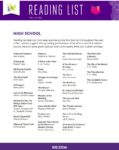Should More Schools Adopt a “No Homework on Weekends” Policy?

“No homework tonight!” From time to time, some teachers surprise their students with that announcement at the closing bell of class. In some schools, though, that’s becoming the norm rather than the exception—at least on specially designated weekends.

A Seasonal Gift for Some
Fall is the season to give thanks and be merry. It’s also the countdown to college admissions due dates. And it’s a great time to land a seasonal job and make some extra money at the end of the year. In states such as Maryland , several schools have designated homework-free weekend periods this fall. It allows over-stressed kids to catch up with other responsibilities—or simply take a breather. The main reason for the break, though, is that college priority and early admissions deadlines for many top colleges in the region occur in the fall.
Schools in Princeton, New Jersey, began implementing one homework-free weekend each semester in 2015, in part to give students more time to pursue interests and passions outside of school. Other New Jersey schools limit the number of minutes students should spend on homework each night. In Hinsdale, Illinois , one high school began offering seniors one homework-free weekend in October “to give harried seniors a little break to prepare for their futures . . . and make sure they have enough time to work on their college applications.” Similarly, schools across the country offer a no-homework weekend at year’s end.
Not Without Downsides
Unfortunately, homework-free weekends sometimes create an unwelcome side effect: extra-homework weekdays. Teachers are still tasked with finishing their lesson plans, and homework is often an important part of that. For students who are working on projects with pending due dates, not working on those projects for an entire weekend may not be feasible. And there’s always the risk that students who are afforded extra time to catch up on college admissions and pursue positive endeavors may simply waste the free time bestowed upon them.
Is homework helpful or harmful?
Some teachers and school districts have taken a blanket approach and banned homework entirely. The value of homework as a whole has been a topic of much debate. In one study , researchers at University of Virginia’s Curry School of Education concluded that math and science homework didn’t lead students to achieve better grades , but it did lead to better standardized test results.
A Stanford researcher concluded that excess homework increases kids’ stress and sleep deprivation. She emphasized that homework shouldn’t be assigned simply as a routine practice; it should have a concrete purpose and benefit. Homework, especially thoughtful homework, is valuable, and eliminating it entirely may be counterproductive to the goal of attending school in the first place: mastering the subject matter.
What do you think?
It’s a safe assumption that most students would strongly favor a homework-free-weekends policy. We’re curious how parents feel about the idea. How would you feel if your child’s school implemented a “no homework on the weekends” policy? Would you worry that your children might fall behind peers in other schools without a similar policy? Or do you think it would encourage your children to engage in more valuable extracurricular activities, get jobs, spend more time completing their college admissions packets, or simply catch up on much-needed sleep? We’d love to know what you think.
Related Articles

Making Friends and Memories in Online School: Social Opportunities for Your Child
October 30 2024

6 Ways to Help Your Child Combat Test Anxiety
October 23 2024

5 Expert Tips to Manage Academic Stress

How Robotics Opens Doors to Promising Careers
October 15 2024

5 Reasons Families Choose Online School for Special Education

From Bored to Engaged: 7 Ways Game-Based Learning Keeps Your Child Motivated
October 11 2024

5 Free Resources to Introduce Your Child to Coding

Get your plans organized with our new daily and monthly planners
October 3 2024

Should Parents Help with Homework?
September 30 2024

Helping Your Military Kids Thrive: Navigating Their Unique Challenges
September 27 2024

Navigating Learning Paths: Should Your Kids Attend Different Schools?
September 23 2024

Weaving Two Worlds: A New Parent’s Perspective on Passing Down Latin Traditions
September 19 2024

Celebrating Cultures in the Spanish Classroom During Hispanic Heritage Month: A Personal Journey
September 16 2024

Study Smarter, Not Harder: 9 Ways to Make Studying More Fun

Navigating Your Pre-K Options: Public, Private, or Virtual
September 9 2024

Helping Your Teen Craft Their First Resume: A Parent’s Guide

Six Ways Online Learning Transforms the Academic Journey
September 5 2024

Encouraging Kids to Love Writing: Fun Activities to Spark Creativity
September 3 2024

A High School Senior’s Checklist for a Great Year
September 2 2024

Turn Up the Music: The Benefits of Music in Classrooms
August 27 2024

How to Create a Bully-Free Zone

A Parent’s Guide to Managing and Reducing Student Stress
August 26 2024

Protecting Your Child from Bullying: Signs, Solutions, and the Role of Online Schools

QUIZ: 20 Fun Trivia Facts to Celebrate Culture and Diversity
August 20 2024

15 Must-Read Books this Hispanic Heritage Month
August 19 2024

5 Factors That Affect Learning: Insights for Parents
August 12 2024

Navigating the College Application Process: A Timeline for High School Students and Their Parents

Education Online? One Family’s Success Story
August 7 2024

Esports vs. Traditional Sports: Exploring Their Surprising Similarities and Key Differences
August 5 2024

Tips for Choosing the Right School for Your Child

Can Homeschooled Students Play School Sports?
August 2 2024

What is Esports and Why Should My Child Participate?
July 23 2024

Enhance Your Student-Athlete’s Competitive Edge with Online Schooling
July 22 2024

Preparing for the First Day of Online School
July 12 2024

Why Arts Education is Important in School

Online School Reviews: What People Are Saying About Online School

Smart Classrooms, Smart Kids: How AI is Changing Education

Everyone Wins When Parents Get Involved In Their Child’s Education
July 11 2024

5 Ways to Start the School Year with Confidence
July 8 2024

Top Four Reasons Families Are Choosing Online School in the Upcoming Year

Life After High School: Online School Prepares Your Child For The Future
July 2 2024

Tips for Scheduling Your Online School Day


The Ultimate Back-to-School List for Online and Traditional School
July 1 2024

Nurturing Digital Literacy in Today’s Kids: A Parent’s Guide
June 25 2024

What Public Schools Can Do About Special Education Teacher Shortages
June 24 2024

Best Children’s Audiobooks Free

7 Fun Outdoor Summer Activities for Kids
June 18 2024

Beat the Summer Slide: Tips for Keeping Young Minds Active
June 11 2024

How to Encourage Your Child To Pursue a Career

Easy Science Experiments For Kids To Do At Home This Summer
May 31 2024

4 Ways to Get Healthcare Experience in High School
May 29 2024

5 Strategies for Keeping Students Engaged in Online Learning
May 21 2024

How Parents Can Prevent Isolation and Loneliness During Summer Break
May 14 2024

Gifts for Teachers

How to Thank a Teacher: Heartfelt Gestures They Won’t Forget

Six Ways Online Schools Can Support Military Families

Things to Tell the Teacher About Your Child Examples
April 30 2024

Countdown to Graduation: How to Prepare for the Big Day
April 23 2024

How am I Going to Pay for College?
April 16 2024

5 Major Benefits of Summer School
April 12 2024

Types of Poems
April 9 2024

A Parent’s Guide to Tough Conversations
April 2 2024

The Importance of Reading to Children and Its Enhancements to Their Development
March 26 2024

5 Steps to Master College-Level Reading
March 19 2024

10 Timeless Stories to Inspire Your Reader: Elementary, Middle, and High Schoolers
March 15 2024

From Books to Tech: Why Libraries Are Still Important in the Digital Age
March 13 2024

The Evolution of Learning: How Education is Transforming for Future Generations
March 11 2024

The Ultimate Guide to Reading Month: 4 Top Reading Activities for Kids
March 1 2024

Make Learning Fun: The 10 Best Educational YouTube Channels for Kids
February 27 2024

The Value of Soft Skills for Students in the Age of AI
February 20 2024

30 Questions to Ask at Your Next Parent-Teacher Conference
February 6 2024

Four Life Skills to Teach Teenagers for Strong Resumes
January 25 2024

Exploring the Social Side of Online School: Fun Activities and Social Opportunities Await
January 9 2024

Is Your Child Ready for Advanced Learning? Discover Your Options.
January 8 2024

Your Ultimate Guide to Holiday Fun and Activities
December 18 2023

Free Printable Holiday Coloring Pages to Inspire Your Child’s Inner Artist
December 12 2023

Good Reasons to Switch Classes in Middle School
December 5 2023

A Parent’s Guide to Switching Schools Midyear
November 29 2023

Building Strong Study Habits: Back-to-School Edition
November 17 2023

A Parent’s Guide to Robotics for Kids
November 6 2023

How to Get Ahead of Cyberbullying
October 30 2023

Bullying’s Effect on Students and How to Help
October 25 2023

Bullying Signs
October 16 2023
Could the Online Classroom Be the Solution to Bullying?
October 11 2023

Bullying Prevention Starts With Parents
October 9 2023

30 Books to Add to Your Reading List in High School
January 1 2014

Do Kids Get Too Much Homework?
January 9 2017

Back to School: Best School Supplies for High School Students
July 31 2014
Sign up for our newsletter
Subscribe to our newsletter and join America’s premier community dedicated to helping students reach their full potential.
Welcome! Subscribe to our newsletter and join America’s premier community dedicated to helping students reach their full potential.
